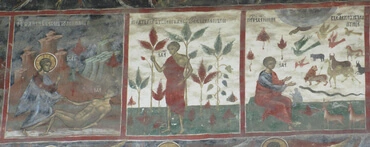Explication de Genèse 2:19
Par Brian David (traduit automatiquement en Français)

Les membres de la Très Ancienne Église avaient commencé à vouloir se diriger eux-mêmes et à penser à partir d'eux-mêmes plutôt que du Seigneur. Le Seigneur savait que cela causerait leur perte, et il a cherché à les combler par les dons spirituels qu'ils possédaient déjà dans leur état céleste.
Ici, nous voyons le Seigneur leur montrer la présence en eux (le sol) de toutes les belles choses de leur état : les affections jaillissant de l'amour pour le Seigneur (les bêtes des champs), les pensées inspirées par l'amour mutuel (les oiseaux du ciel) et toute autre activité spirituelle remplie de la vie du Seigneur (les créatures vivantes). Et ces choses étaient des dons ; le fait que le peuple ait été invité à nommer les animaux signifie qu'on lui a montré la nature de toutes ces choses merveilleuses.
(références: Arcanes Célestes 142, 143, 144, 145)
Arcana Coelestia #10536
10536. 'And no one put on his finery' means the nature of their external which is such that it lacks what is Divine. This is clear from the meaning of 'finery' as the presence of what is Divine in external things, so that 'not putting on his finery' means the absence of what is Divine in those things. The reason why 'finery' has this meaning is that 'finery' relates to clothing, and Divine Truths are meant by clothing generally. The reason why Divine Truths are meant by clothing generally lies in things in the next life that are representative. All there, both angels and spirits, appear clothed in garments, each one in garments that accord with his truths. Those in possession of truths that are authentic and come from God appear clothed in brilliantly white garments; others appear in others different from these. Spirits indeed do not know where their garments come from; they are clothed without their knowing how. And also the garments they wear are varied, as determined by the changes of state they undergo in respect of truths. In short, the character of their understanding is what is revealed and represented by their garments; for everyone's understanding is shaped by truths and comes to have the same nature as the truths which compose it. The understanding which angels in heaven possess resides on an inner level with them, as a consequence of which their garments are brilliant and white. The brilliance is due to Divine Good, and the whiteness to the light of heaven, which is Divine Truth. But the garments of those whose interest lies in external things and not in what is internal are drab and torn, like those of beggars in the streets or robbers in the forests. From all this what is meant by 'finery' may be seen, namely the Church's holy truths, and therefore 'not putting on finery' means the absence of the Church's holy truths, and in reference to the Israelite nation, whose interest lay in external things and not in what was internal, means the nature of their external which was such that it lacked truths from God.
Truths are meant by 'garments', see 2132, 2576, 4545, 4763, 5248, 5319, 5954, 6378, 6914, 6917, 6918, 9093, 9158, 9212, 9216, 9814, 9827, 9952.
What is meant by the garments of Aaron and his sons, 9814, 10068.
'Finery' in the Word means the Church's holy truths, see below in 10540.






